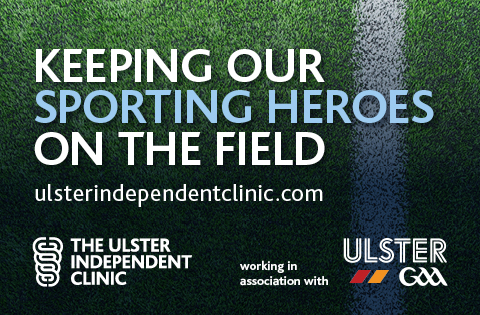Maghera’s rise in hurling
WHEN Séamas McAleenan entered St Patrick’s Maghera as a young teacher in October 1983, the school had just won their first ever Ulster Colleges’ hurling title, the Foresters’ Cup, and a month later went on to claim a first ever Mageean title.
Very quickly the school’s reputation for the small ball game grew and they were competing for All-Ireland titles as regularly as the were in football.
Joe McGurk was a key figure in that hurling revolution and this week he discussed with Séamas the various strands that came together to create the hurling tradition in the school.
“I actually was in the first First Year class to enter St Patrick’s Maghera when the school opened in 1963 and I can only remember playing one hurling match in my seven years there. It might have been ’69 or ’70 and the game was over in Ballycastle. I couldn’t say if it was a challenge game or a Mageean Cup game, but we were tanked.
“Patsy Quigg put that team out and he was always enthusiastic about hurling. He played for Sluaghtneil himself. However there wasn’t a lot going on in underage hurling at the time in Derry and competing against the Antrim schools was a big ask.
“Liam Hinphey was working hard in Dungiven at the time, both in the school and in the club. At that time not too many would have come over the hill from Dungiven to school in Maghera. Any that were not in school with Liam would have been at St Columb’s in Derry.
“Liam had a Derry Vocational Schools’ team going and I played with them around 1968. Tom McGill and Martin Mulholland were probably the only other two from Maghera in that team. That then followed through to a minor team that actually played in Croke Park in an All-Ireland B semi-final against Kildare in 1970.”
McGurk the student left St Patrick’s in 1970 and returned as McGurk the teacher eight years later. Hurling at both school and county level hadn’t moved a lot in the interim while St Patrick’s Magehra had just won the MacRory Cup for the first time. Change however was on the way.
“Dungiven were Derry’s representatives in the All-Ireland Féile for a few years and then we took Lavey down to Limerick in 1974 and we were in South Liberties. I was taking the team and drove the minibus down with Tom (McGill).
“I suppose from around then you could see more structured training and games at the younger age-groups in clubs and that was filtering through to the school as well.
“Patsy (Quigg) was still putting hurling teams out on the pitch to represent the school but there wasn’t a lot of visable progress – plenty of tankings, a few decent performances – and that was still the case during my early years as a teacher.
“However each year I could see more boys coming into the school with more of the basic skills and I suppose I had the extra motivation in that my younger brothers were students at the time.
“Colm started on the same day as I did in 1978, Ciaran was younger still and Johnny and Paddy were still in Junior years. Plenty of the Lavey boys were there too and the club was going to benefit from what hurling they got in school.
“The first major sign of progress was reaching a Gallagher Cup final in 1981. Although we lost to St Patrick’s Downpatrick, we went on to win the Foresters’ Cup a couple of years later with more or less the same panel.”
THERE was change under way also in Ulster Colleges’ hurling at the time.
The Mageean Cup had been introduced in 1963 and St MacNissi’s Garron Tower won the first two titles. Then St Mary’s CBS took over and won the next 12 titles and added two All-Irelands in 1971 and 1974.
Cross and Passion Ballycastle made the breakthrough for back-to-back titles in 1977 and 1978 with the likes of Olcan McFetridge and Brian Donnelly featuring. St Mary’s won another couple before St Patrick’s Armagh collected the 1982 crown. Soon after that there were first titles for Maghera and St Louis Ballymena
While there still was only one grade of competition at each age-group, new contenders were still able to bridge the gap and compete for silverware, Maghera and Downpatrick being further examples of the shift away from the base that had been set in the previous couple of decades.
Joe McGurk feels that the shift towards structured training helped bridge the gap.
“This was happening right through the clubs and schools in the 1970s where younger coaches were coming through to take teams.
“If they were PE teachers, they were coming out from teacher training colleges with all the coaching skills. If they were teachers of other subjects like myself, they would have attended one of the coaching courses that were springing up and consequently they approached school training in a completely different way to what went before.”
He also references the MacRory Cup success in the school as a help and not a hindrance.
“The best hurlers in all those teams that you and I took in the 1980s and 1990s were also featuring on the school football teams. The template was already set in terms of fitness, work-rate and even their expectation for a training session. What they got in football, tehy wanted in hurling.”
“When you think back to the boys we both were working with, Séamas, they were real athletes. I mean we could have been taking basketball or soccer – any sport – and they had the capacity to adapt and perform at the top level.
“The team that won the first Mageean in 1983 is really a snapshot of a lot of elements coming together.
“You had the Lavey and Dungiven boys who would have been exposed to a good degree of hurling training and were playing at a good standard at club level.
“Then you would have a few players from other clubs who were into their hurling, but maybe didn’t have the club players around them to move forward.
“I’m thinking of Cathal and Leonard Donnelly, Seamus O’Neill from Ballinascreen, the Cassidys from Slaughtneil, Benny O’Hagan from Swatragh, the McGrellis boys from Banagher.
“Then you had the families. My own brothers, the Downeys, the Mullans, the Cassidys. I don’t think there was a hurling or camogie team for the next 15 years in the school that hadn’t a McGrellis about it.
“And you had the likes of Damian Cassidy, Colm McElwee and Enda Gormley. None of them came from hurling clubs, but they played right through the school and improved every year.
“Damian played through the age groups with Lavey which was a big thing for a Bellaghy lad. But his mother came from Dunloy, he would have had a hurl in his hand as a youngster and he was really good. Damian scored 3-3 in the final against St Louis Ballymena in Bellaghy.
“Then we lost a few boys because of the age-difference between Ulster and the All-Ireland and Danny Quinn wanted to play. He came out to train, got better every day and ended up full-forward in the All-Ireland semi-final against Scariff Community School from Clare.
“Danny’s second ever hurling match was an All-Ireland final in Croke Park against Castlecomer from Kilkenny in 1984 and it was played before the two semi-finals in the Centenary Cup. The next year he scored two goals in the Mageean final against Ballycastle.
“Don Mulholland was on that first winning team. He played in four finals in the same school year, Mageean and Foresters’ inhurling and Rannafast and MacRory in football and won all four. I don’t think anyone has ever equalled that that.
“Then the second batch of hurlers in the late 1980s were mostly dual players. Anthony Tohill’s last match in Maghera school colours was a Mageean final and he scored a goal in it.
“Brian McCormick, Geoffrey McGonigle, Ronan McCloskey, Hugh Mullan, Gregory Simpson …. They were dual players. So the mentors at the different age levels in the school accomodated them.
“It certainly helped that the school football and hurling competitions were at different times of the year. There were a few years that the Ulster Council tried to run the Mageean as a spring competition that would follow through to the All-Ireland. It didn’t work at all with the MacRory running concurrent.”
But there were also times where Derry minor championships in both codes were concluding during the Mageean Cup window of September to Halloween.
“There were issues from time to time certainly and this was before floodlit games in the evening. So you had boys expected to play a Mageean Cup game on a Saturday morning and then a club semi-final in the afternoon.
“Sometimes the club pulled the player and it is really speculation whether or not we would have won the Mageean game with a full team.
“In more recent years that is not an issue at all as the Derry fixtures’ committee have accomodated the schools a lot better at all levels.
“I come from a dual club (Lavey) and all my family have played both codes. Had football not been as strong in Lavey and in Derry at the time, would we have been able to have won an Ulster club hurling title? I don’t know. But the boys got the best chance possible to achieve at both codes.
“Slaughtneil have had phenominal recent success in both codes. This year they gave Ballyhale a great game in the semi-final. Some say they came so close because they weren’t running with football at the same time.
“But if you look at the two boys who got on to the AIB club team of the championship, they are recognised more as intercounty footballers than hurlers (Brendan Rogers and Chrissy McKaigue).”
The winners of the Mageean Cup normally go through to the All-Ireland schools’ B championship – back then the O’Keefe Cup, now the Paddy Buggy Cup. However McGurk took the decision in 1992 to challenge for the Croke Cup – the A championship.
“That team with the likes of Geoffrey McGonigle, Michael Collins etc was a good all round team, they had come through the school as winners, all of them were fine hurlers and we hammered a decent St MacNissi’s Garron Tower team in the Mageean final.
“Around the same time Derry seniors were playing at the top end of Division 2 of the National League and you had the likes of Cork and Waterford playing in Lavey or Dungiven.
“If Derry hurling was ever going to break through, we had to have our underage players playing against teams from these counties. A decade earlier we blew away their fear of competing against Antrim hurlers at inter-county under-age level when Lavey won the Antrim minor league two years in a row and Maghera then took that through to win the Mageean.
“We went for it and played against St Colman’s Fermoy one year and St Kieran’s Kilkenny the next. We performed well in both – I think we were beaten by 1-10 to 1-5 or something like that. That brought them on a lot more than beating smaller schools to win the O’Keefe.
“What happened regarding hurling in Maghera really came about because a number of elements came together in the early 1980s, club hurling getting stronger, superb all round athletes. The situation was just right and if you look at that first team, you wonder why it didn’t happen earlier.
“But once we got ourselves established as a top hurling school, we felt that we had to make our contribution to help Derry hurling take the next step. We needed to push boundaries.”
St Patrick’s Maghera Mageean winners 1983
Back (l-r) : Finbar Diamond, Niall Mullan, Mark Cassidy, Martin McKenna, Don Mulholland, Patrick Cassidy, Sean Regan
Middle row : Fr Robert Devine, Benny O’Hagan, Enda Gormley, Fergal Hurley, Colm McElwee, Séamus Downey, Leonard Donnelly, Paddy McGrellis, Joe McGurk (manager).
Front Row : Dominic McAtamney, Seamus O’Neill, Peter McGrellis, Cathal Donnelly, Johnny McGurk capt, Damian Cassidy, Henry Downey, Colm McGurk Gerard McGillon
St Patrick’s Maghera MacNamee Cup winners 1985
The captain Brian McCormick already had a Mageean medal as goalie before he captained the school to this first MacNamee win after a replay against St Mary’s CBS.
Back Row : Jamie Heron, Terence McMullan, Mel Higgins, Gareth Dempsey, Declan McAlary, Eunan O’Kane, Harry Tohill, Ciarán O’Connell, Fergal Convery, Ryan Murphy, Kevin O’Kane
Middle : Fr Robert Devine Principal, P O’Doherty, Christopher Hurley, Joe Young, Liam Lee, Fergal McNally, Noel Kearney, Davey McCloskey, Gregory Simpson, Enda McCloy, Séamas McAleenan and Michael McKenna (coaches)
Front : Patrick McErlean, Niall McGuigan, Patrick McCloy, Brian McGrellis, Brian McCormick, Paul McGlone, Paul Groogan, Michael Collins, Eamon Hasson
St Patrick’s Maghera Mageean Cup winners 1989 pictured before the semi-final v St MacNissi’s Garron Tower in Dunloy
Back Row : Ryan Murphy, Paul Groogan, Patrick McCloy, Patrick McCormick, Ciaran Higgins, Brendan Ward, Stephen Friel, Cormac Convery, Sean Brolly, Eoin McCloskey, Adrian McAtamney, Hugh Mullan
Front : Geoffrey McGonigle, Thomas Ward, Michael Collins, Joe Young, Colm Dillon, Brian McCormick capt., Anthony Tohill, Paul McCloy, Patrick McEldowney, Gregory Simpson, Ronan McCloskey, Andrew McBride
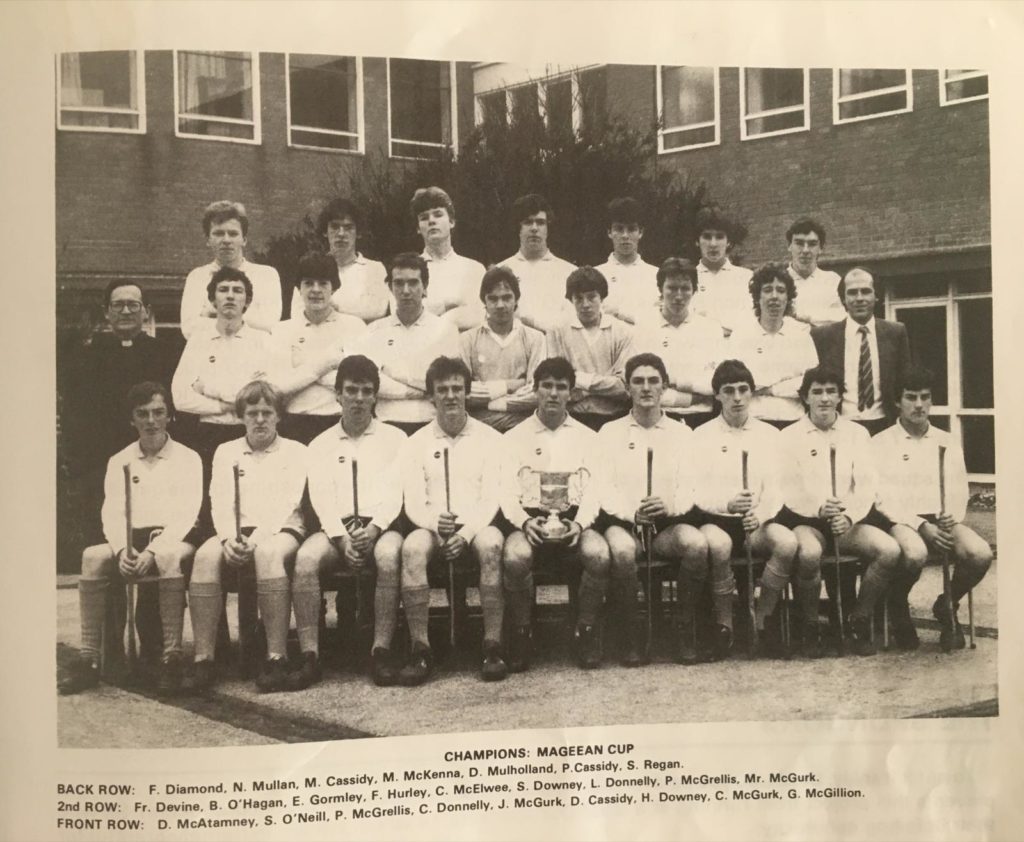
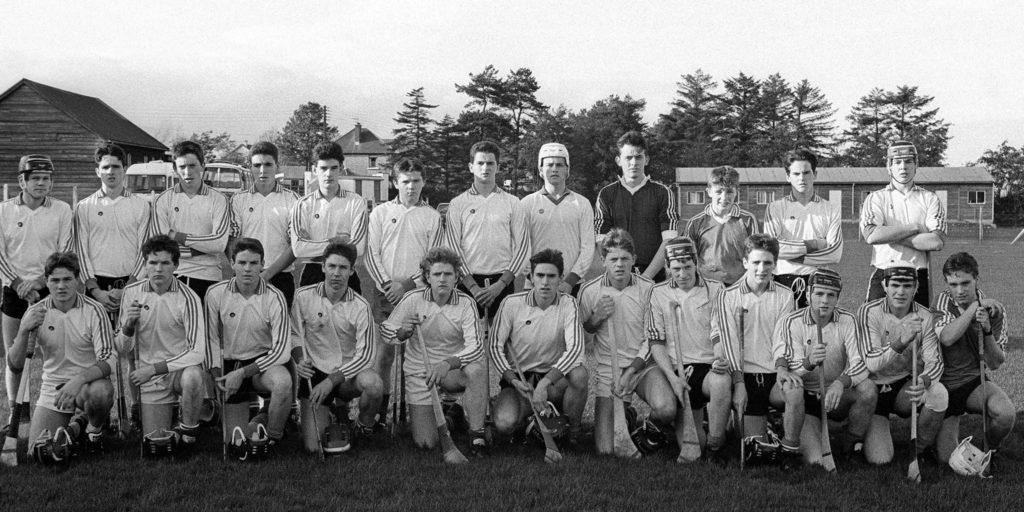
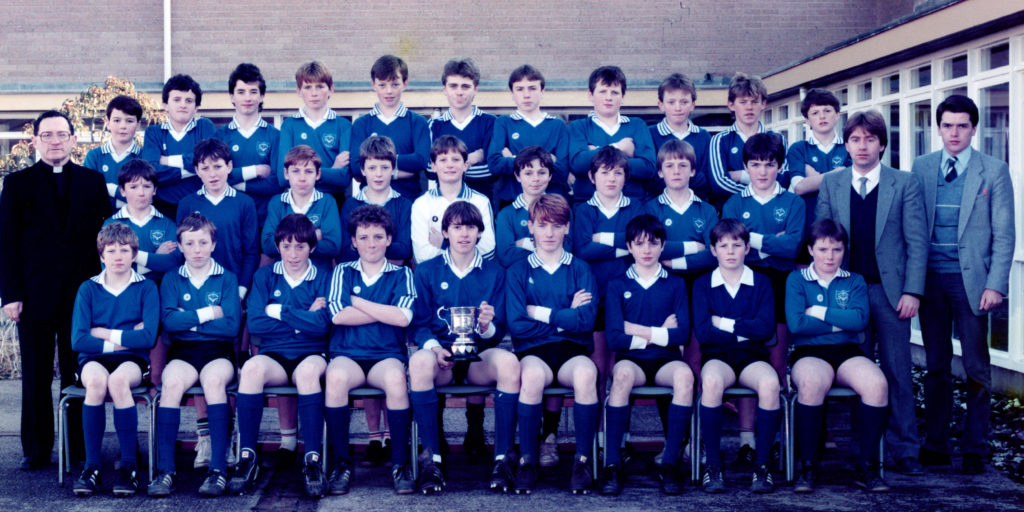
Corn Mhic Con Midhe Winners 1985/86
